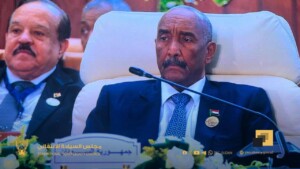Highway and port blocked in eastern Sudan
Protests against the eastern Sudan Track deal in the Juba Peace Agreement continued yesterday in the Red Sea state for the second day in a row.
 A protest against the eastern Sudan Track agreement in Port Sudan yesterday (Social media)
A protest against the eastern Sudan Track agreement in Port Sudan yesterday (Social media)
Protests against the eastern Sudan Track deal in the Juba Peace Agreement continued yesterday in the Red Sea state for the second day in a row.
Port workers among the protestors closed all gates of the southern port in Port Sudan with containers. Others blocked the Port Sudan-Khartoum highway in Sinkat and Haya immediately after the peace agreement was signed in Juba on Saturday. The Port Sudan-Khartoum highway has been blocked in July as well.
Spokesman for the Beja Council Abdallah Obshar told Radio Dabanga that the council will continue to escalate the protests in the state until the federal government responds to its demands. He said closing the road with barricades was “to protect the protesters from any possible attack”.
Taha Faki, a leading member of the Beja Nazirs Council, denounced the National Umma Party’s rejection of their demand for the right to self-determination of eastern Sudan. He said at a press conference in Port Sudan that “the NUP is not the guardian of eastern Sudan”.
“We also wonder why closing the highway is considered ‘a red line’, while the revolution brought down the former regime through a sit-in blocking one of the main roads in the Sudanese capital,” he said. He added: “We are ready to die for our rights.”
Beja leader Odeis Mohamed Ali renewed their demand for self-determination and possible secession, and stated that the port and the highway remain closed “until our rights are restored”.

Ports Authority Syndicate
Abboud Sharbini, head of the Ports Authority Syndicate in Port Sudan, said that four gates to the port are blocked, in solidarity with the protests against the eastern Sudan Track agreement. He attributed his position to “the agenda of external parties aiming to privatise the ports in Port Sudan”.
The National Network for Social Justice warned that the closure of Khartoum-Port Sudan highway is “a threat to the safety of people travelling by car, bus, or lorry, and may lead to theft of their belongings”.
The network condemned “that protestors target travellers from a specific social background”, considering this “targeting on the basis of ethnic identity”. The network wondered why the state is not maintaining order. It called on the Rapid Support Forces to restore security in the area “to prevent further escalation and chaos”.
Three nazirs in Red Sea state said in a press statement on Sunday that they reject the protests in Port Sudan against the eastern Sudan Track of the Juba Peace Agreement.
“These protests only stir up discord and negative developments that threaten the security.”
Tribal fighting in eastern Sudan cost five people their lives in August, dozens were injured. On Sunday, nazirs blamed recent tribal clashes on the eastern Sudan Track agreement.
* A nazir is a state-appointed administrative chief of a tribe, according to the Native Administration system in Sudan.
Radio Dabanga’s editorial independence means that we can continue to provide factual updates about political developments to Sudanese and international actors, educate people about how to avoid outbreaks of infectious diseases, and provide a window to the world for those in all corners of Sudan. Support Radio Dabanga for as little as €2.50, the equivalent of a cup of coffee.












 and then
and then